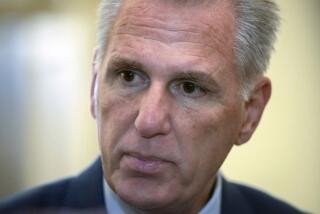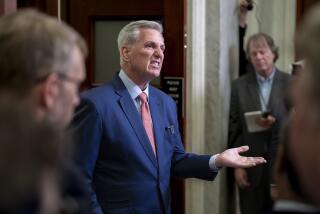U.S. Treasury to take ‘extraordinary measures’ to avoid debt limit
- Share via
Reporting from Washington — The federal government will start using “extraordinary measures” this week to juggle its finances to avoid hitting the nation’s debt limit this month, Treasury Secretary Timothy F. Geithner told congressional leaders.
The $14.3-trillion debt ceiling is on track to be reached May 16. And because Congress apparently won’t act before then, the Treasury will take steps to avoid defaulting on its payments, Geithner said Monday.
But those steps would hold off a potential government default only until about Aug. 2, Geithner said. That is three weeks later than he projected last month.
“While this updated estimate in theory gives Congress additional time to complete work on increasing the debt limit, I caution strongly against delaying action,” Geithner wrote in a letter to House Speaker John Boehner (R-Ohio), Senate Majority Leader Harry Reid (D-Nev.) and other key lawmakers.
“The economy is still in the early stages of recovery, and financial markets here and around the world are watching the United States closely. Delaying action risks a loss of confidence and accompanying negative economic effects,” he wrote.
Starting Friday, the Treasury will stop issuing State and Local Government Series securities, which count against the debt limit. The securities are used by governments to manage their expenses on tax-exempt bonds, and the move will deprive them of “an important tool,” Geithner said.
More measures will be needed after May 16, he said.
Congress has voted to raise the legal limit on federal borrowing 75 times since 1962. But soaring budget deficits have led most Republicans, along with some Democrats, to push for spending restraints as part of any deal to raise the debt ceiling again.
“This does not change the fact that the American people won’t tolerate an increase in the debt limit without meaningful cuts and spending reforms,” Boehner spokesman Michael Steel said of Geithner’s new warning .
Vice President Joe Biden is scheduled to meet with congressional leaders Thursday to begin deficit reduction negotiations tied to a debt-ceiling vote. But those talks are unlikely to lead to any legislative action by May 16.
Geithner said that on May 16, he would take two additional steps to buy more time before the limit is reached.
He would suspend issuing new federal debt for the Civil Service Retirement and Disability Fund, which would allow Treasury securities held by the fund to be redeemed. The Treasury also would suspend the daily reinvestment of securities held by the investment fund for the Federal Employees Retirement System’s Thrift Savings Plan.
Additional steps also might be needed, Geithner said. But he warned of the “catastrophic economic impact” of the U.S. defaulting on its obligations if Congress does not raise the limit.
Those ramifications would include a government halt or limit to Social Security and Medicare payments, tax refunds, unemployment benefits and military paychecks, he said. Interest rates probably would increase as well, affecting mortgages and other borrowing.
“Default would cause a financial crisis potentially more severe than the crisis from which we are now starting to recover,” Geithner wrote.
More to Read
Inside the business of entertainment
The Wide Shot brings you news, analysis and insights on everything from streaming wars to production — and what it all means for the future.
You may occasionally receive promotional content from the Los Angeles Times.











